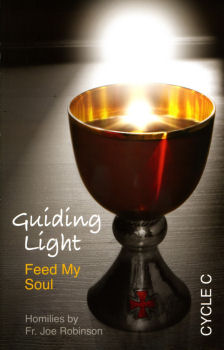
|
Posted January 29, 2010
Book: Guiding Light: Feed My Soul Author: Fr. Joe Robinson Shepherd of Christ Ministries. China. IN. 2010. Pp. 201 An Excerpt from the Jacket:
In Fr. Joe’s third book of homilies from Cycle C, we are reminded of the charity that Christ intended us to show each other. We have a calling to turn the other cheek and be the Good Samaritan to others. We are rewarded with the Father’s kingdom and love when we are not worthy. We are now left alone or hungry. An Excerpt from the Book — the Fourth Sunday in Ordinary Time Homily — Calvin Coolidge, who was a man of few words, came home from church one day and his wife asked him what the preacher talked about. He said “Sin.” She asked, “What did he say about it?” He said “He was against it!” If someone asks you what the preacher talked about today you can say “Just ordinary stuff!” “Ordinary” is the keyword of my remarks today. I think one of the reasons Jesus got into trouble in Nazareth was because he was so ordinary. His friends and neighbors could not conceive that he was any better than they were. St. Luke glosses over the conflict between Jesus and his neighbors with the one question he tells us they asked: “Isn’t this the son of Joseph?” But if you read St. Mark’s account of Jesus visit to Nazareth, Mark is very blunt. He tells us the people were asking “Where did this man get all this?” What is this wisdom that has been given to him? Isn’t this the carpenter, the son of Mary. . .?” In that culture boys were identified by their father. Calling Jesus the son of Mary is an allusion to Joseph not being Jesus’ natural father and would have been an insult both to Mary and Jesus. Their rejection of Jesus and their desire to kill him foreshadow the future of Jesus. In today’s second reading we heard one of the best known and best loved passages in Scripture: St. Paul’s description of love. What is so beautiful abut this passage is that it doesn’t deal with those thrilling moments when all of our being is charged with excitement and joy. It deals with the ordinary everyday kind of love that ordinary living requires. Paul describes this kind of love by telling us what love is not rather than what it is. It is not jealous, pompous, rude or selfish, it is not short-tempered nor does it hold grudges. It is patient and kind and trusting and willing to put up with all kinds of annoyances. This is not about falling in love – a period of infatuation that may or may not lead to real love. Paul is talking about our ordinary day-to-day contact with other people, some of whom we may not like a whole lot, but whom we learn how to be kind to nevertheless. Practicing ths ordinary kind of love doesn’t always sweep us off our feet, but it does bring a kind of joy, because our vocation and our fulfillment in life is to learn how to love one another. On this fourth Sunday of Ordinary time we hear about ordinary things. But in the ordinary is the extraordinary if we know how to find it. As the poet George Elliot said, “If we had a keen vision of all that is ordinary in human life, it would be like hearing the grass grow or the squirrel’s heartbeat, and we should die of that roar which is the other side of silence.” it is through ordinary things that God touches our lives most of the time, through prayer and music, through the same Scriptures we’ve heard again and again, through bread and through the weekly Eucharist. We are perhaps surrounded by the same ordinary people we’ve seen week after week for years. Through our being together in prayer we become one body in Christ, and in Christ we love and worship our heavenly Father. Sometimes it feels pretty ordinary, but for those who can see more deeply, the mystery we celebrate is awesome. Table of Contents: Homilies of Cycle C throughout the year |
|
